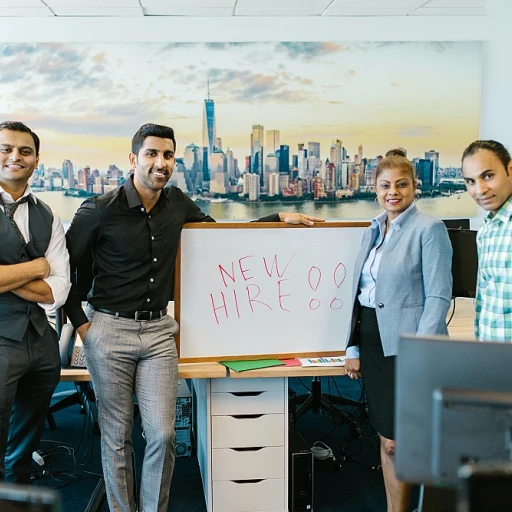
Understanding the Role of Change Management in HR Innovation
Importance of Managing Change within HR
The role of change management in human resources cannot be overstated. It is central in orchestrating successful change initiatives, primarily because it impacts key organizational elements such as stakeholders and processes. When transformation projects are initiated, they often bring a wave of resistance from employees. This is precisely why the change manager's skills in communication and decision making are crucial to manage change effectively.
Core Objectives in Change Processes
- Ensure all team members understand the purpose of the change initiative and their role within it.
- Mitigate resistance by engaging stakeholders early in the change process.
- Maintain continuous communication to keep all parties aligned.
Achieving these objectives necessitates specific competencies which are further explored in the key competencies section. Change managers must demonstrate an aptitude for leading initiatives while keeping the focus on the ultimate goals of the project.
Setting the Stage for Effective Change Management
The process of crafting and asking the right interview questions is essential in evaluating the suitability of change management professionals. Well-structured questions can reveal how prospective team members have handled organizational change in the past, assessed resistance, and utilized their skills to guide successful change.
Key Competencies for Change Management Professionals
Essential Competencies for Successful Change Management
In the realm of change management, having the right set of skills is crucial for ensuring a smooth transition during organizational changes. Change managers are tasked with the critical job of guiding change initiatives and managing resistance effectively. Below are key competencies that professionals in this field must possess to succeed in their roles:
- Communication Skills: Effective communication is the backbone of any change management process. It is essential for relaying the change initiative's goals, processes, and benefits to stakeholders and team members. Clear communication helps in mitigating resistance and fostering an understanding of the change efforts across the organization.
- Leadership and Decision-Making: A competent change manager must demonstrate strong leadership qualities to inspire trust and confidence among employees. Effective decision-making ensures that the change project is steered in the right direction and adapts to any unforeseen challenges.
- Stakeholder Engagement: Understanding the perspectives of various stakeholders is crucial when managing change. A change manager should engage stakeholders early and often to align everyone's interests and ensure a united front during the change implementation.
- Training and Development: Proficiency in designing and delivering training programs that equip employees with the necessary skills and knowledge to embrace changes is critical. This reduces resistance and promotes smooth adaptation to new initiatives.
- Project Management: Managing the timelines, resources, and scope of change initiatives is fundamental for success. The ability to oversee a change process from inception to completion, while ensuring it meets its objectives, lies at the heart of effective change management.
- Adaptability: Change managers must remain flexible and ready to adjust plans as necessary to adapt to evolving organizational needs or resistance to change. This adaptability facilitates a more resilient approach to leadership during change.
For a deeper dive into how innovative software solutions can enhance change management processes, visit enhancing change management with innovative technology.
Crafting Effective Change Management Interview Questions
Creating Thoughtful Visibility into Adaptation Strategies
Crafting effective interview questions for change management roles is critical to identifying candidates with the right skills and mindset to drive successful change initiatives. Change managers are pivotal in guiding employees through the organizational change process, managing resistance, and ensuring stakeholders are aligned. Therefore, when formulating interview questions, it is important to cover various aspects of change management.- Communication Skills and Stakeholder Engagement: It's essential to assess how a candidate would communicate change and engage with stakeholders. Questions might include: "How do you ensure clear communication in a large-scale change initiative?" or "Provide an example of how you have managed stakeholder resistance effectively." Answers to these questions will reveal the candidate's ability to convey critical information and influence stakeholder buy-in.
- Adaptability and Flexibility: Given the ever-evolving nature of organizations, adaptability is a crucial competency. Pose questions such as: "Describe a time when you had to adjust your change management strategy in response to new information. How did you manage this change?" This helps gauge their responsiveness and ability to pivot strategies quickly.
- Leadership and Team Collaboration: Effective change managers need to rally teams and lead initiatives. Questions like "Can you share a successful change project you led?" or "How do you manage team dynamics during significant transformation?" will help identify those with strong leadership qualities and teamwork skills.
- Problem-Solving and Decision-Making: Candidates must demonstrate strong problem-solving abilities and sound decision-making. Consider inquiries like: "How do you prioritize competing change initiatives?" or "Describe how you approached a situation where there was substantial resistance to change." These questions underscore their strategic thinking and ability to manage complexity.
Getting Beyond Surface-Level Responses To accurately assess a candidate's capability, it is crucial not only to pose these questions but also to effectively evaluate their responses. Look for details in sample answers that highlight a logical thought process, the application of change management models, and evidence of successful outcomes. Interviewers should also be on the lookout for individuals who can demonstrate previous success in managing change. For more insights and advanced methodologies on assessing these competencies, you may find it useful to explore how the role of CHROs in agile organizations provides a framework for understanding these critical skills. This resource offers valuable perspectives that can augment your interview process, ensuring that you are selecting candidates equipped to lead your organization through change effectively.Evaluating Responses: What to Look ForAssessing Communication and Stakeholder Engagement Skills
When evaluating responses during a change management interview, focus on assessing the candidate's communication skills. Strong communication is the bedrock of managing change effectively, ensuring that all team members and stakeholders are aligned and informed throughout a project. Consider if the candidate emphasizes clarity and consistency in their communication approach. Look out for experiences where they engaged with stakeholders successfully to gain buy-in for change initiatives.
Analyzing Decision-Making and Strategic Thinking
It's crucial to identify how well a candidate can handle decision-making in the context of managing change. During the interview, listen for answers that reflect a logical and strategic approach to decision-making. This should ideally involve analyzing the implications of change initiatives and forecasting potential challenges. Candidates should demonstrate their ability to evaluate options and make informed choices that support organizational goals and a successful change process.
Detecting Resistance Management Tactics
Resistance to change is a common obstacle in any change initiative. Effective change managers are adept at recognizing and mitigating resistance. When evaluating a candidate's response, pay attention to how they identify potential sources of resistance and their strategies for overcoming it. Look for examples of initiatives where they've successfully managed resistance and maintained team cohesion. Effective managers should highlight their ability to adapt their approach to different stakeholders' needs.
Experience with Change Initiatives and Project Management
Interview questions should aim to uncover the candidate's hands-on experience with managing change initiatives. Explore their involvement in previous projects to understand their role, the challenges faced, and the outcomes achieved. Look for candidates who highlight specific skills such as leading diverse teams, aligning change initiatives with strategic objectives, and utilizing project management tools. Experience in managing change at various organizational levels is a valuable indicator of a capable change manager.
Evaluating Training and Continuous Improvement Efforts
An effective change manager should be committed to continuous improvement and learning. Assess their willingness to engage in ongoing training and development to refine their skills and stay updated on industry best practices. This commitment ensures they can navigate evolving challenges and lead change initiatives with innovative solutions. Seek candidates who express a proactive approach to learning and adapting, which is essential for sustained success in managing change.
Common Pitfalls in Change Management Interviews
Avoiding Common Mistakes in Change Management Interviews
When conducting change management interviews, there are several pitfalls that can detract from identifying the best candidates for managing change initiatives within an organization. Recognizing these potential challenges can help ensure a more effective interview process.- Narrow Focus: Overemphasizing technical skills in managing change, such as specific project management methodologies, can lead to overlooking essential soft skills. Communication, empathy, and the ability to engage stakeholders are equally crucial to managing resistance and ensuring successful change.
- Ignoring Context: It's vital to consider the specific context of past change initiatives candidates have managed. Generic questions may miss how candidates deal with unique organizational cultures and varying degrees of resistance change. Tailor questions to assess how applicants adapt their strategies to different environments.
- Not Evaluating Decision-Making Process: Change managers must make informed decisions amidst complexities. Asking targeted management interview questions around decision making can reveal how candidates weigh options, consider team input, and navigate between competing interests.
- Lack of Insight into Emotional Intelligence: Since managing change involves guiding employees through uncertainty, candidates need emotional intelligence to manage team dynamics. Questions should probe how individuals support employees emotionally and mitigate concerns.
- Overlooking Follow-Up: Not all answers can be immediately understood or assessed. It’s crucial to incorporate follow-up questions change who ensure a deeper understanding of the candidate's capabilities. Investigate how the candidate managed resistance change, their communication strategies, and how they aligned initiatives with organizational goals.
Future Trends in Change Management for HR
Embracing the Future of Change in HR
In the dynamic landscape of human resources, change management is becoming increasingly vital. As organizations navigate evolving markets and technological advancements, HR professionals are at the forefront of implementing successful change initiatives. Change management isn't just about managing transitions but about foresight and embracing future trends that redefine how change initiatives are viewed and handled. Here's a glimpse into the future of change management within HR.- Technological Integration: As technology continues to advance, change management must integrate digital tools to streamline the process. The use of data analytics for decision making and predicting resistance to change can lead to more informed initiatives and successful organizational change.
- Enhanced Communication Channels: Effective communication is paramount. Future trends emphasize the need for agile communication strategies to keep stakeholders informed and engaged through various channels. This ensures that all team members are aligned with the change process.
- Continuous Training and Development: The skills needed for managing change will continue to evolve. Incorporating ongoing training programs for change managers and employees alike will help build resilience and adaptability, crucial for managing successful change projects.
- Empathy and Emotional Intelligence: As change management becomes more employee-centric, there will be a greater focus on empathy and emotional intelligence. Understanding employees’ concerns and addressing resistance change with compassion will enhance acceptance and smooth transitions.
- Collaborative Change Management: In future, change will be driven by collaborative efforts across teams rather than top-down directives. Involving employees in the decision-making process helps to ensure buy-in and fosters ownership over change initiatives.













